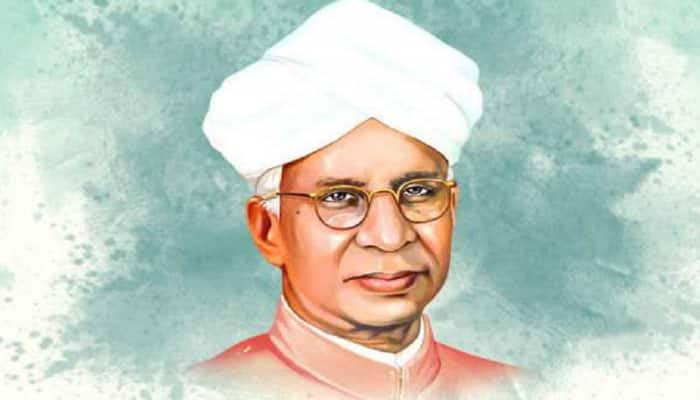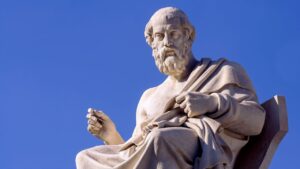Dr. Sarvapalli Radhakrishnan is an internationally renowned philosophical educator and former President of India. Throughout his life he has practiced knowledge. Loved to think of himself as a teacher despite being anointed as a constitutional chief. Hence, his birthday on September 5 has been declared as the Teacher’s Day.
Birth and Family
Radhakrishnan was born in 1888 in a lower middle class orthodox Telugu family. His father’s name is Sarvapalli Veeraswamy and his mother’s name is Sitamma. Radhakrishnan had four brothers and one sister. He was a Brahmin by caste. There were constant shortages in the family.
Education
But poverty never hindered his education. He completed his primary education in his native town of Tirutani. Radhakrishnan studied in Christian schools since childhood. So he acquired special knowledge about Hindu scriptures as well as the Bible. After growing up, Radhakrishnan tried to learn about the different religions of the world. We can see his intellectual talent from childhood. An essay written by him at a very young age was published in a book by Madras University. In 1912, his remarkable book Essential of Psychology was published by Oxford University Press.
Career
M. A. After passing the examination, he joined Madras Presidency College as a professor. In 1911, he received the title of L.T ie Licentiate of Teaching. He taught in this Presidency College for seven consecutive years.
During this time he read Hindu scriptures like Gita, Upanishad etc. Then Shankar Ramanuja etc.’s commentaries read the Brahmasutra. He read some analytical works of Gautama Buddha at that time.
Later, Radhakrishnan established a close relationship with poet Rabindranath Tagore and Mahatma Gandhi. From this time Radhakrishnan started writing essays on philosophy. He was called as honorary professor in various universities of the world. As a philosopher, Radhakrishnan did not express any doctrines of his own. He basically told us about the message of harmony of all religions. Radhakrishnan believed that all human beings on this earth were tiny particles of a great power. Man cannot perceive the composition and characteristics of this energy. Radhakrishnan sincerely wanted to remove negative thoughts from our mind and add positive thoughts.
He had to come from the world of education to the world of diplomacy. The Soviet Union was recognized as one of the most powerful states in the world. A communist government has been established in this vast territory. The ideological differences between the Soviet Union and the Western countries are visible. Radhakrishnan served as India’s ambassador to the Soviet Union for a long time with credit. He established cordial relations with Soviet leaders.
Later this Radhakrishnan had to be sworn in as the constitutional head i.e. President of the world’s largest democratic state. Where is the life of a professor, and where is the life of a president—there is a big difference between the two. Radhakrishnan did not take any controversial decision as President, which raises questions about his acceptability. He has always followed his own path. Sometimes when constitutional crisis arose, he resolved that crisis with the help of Dhishakti. He had good relations with all the members of the cabinet. Not only that, he loved all the opposition leaders sincerely and maintained cordial relations with them too.
Spiritual Consciousness
Along with this Radhakrishnan’s intellectual activities continued. Many books written by him have become famous by writing commentaries and notes on various branches of philosophy. We are amazed to read them. It is hard to believe that one person can write such a beautiful report on so many subjects in one lifetime. This proves what kind of intellectual man Radhakrishnan was.
Various interpretations of Western philosophy have been presented in the context of modernity. Radhakrishnan while explaining something about philosophy says that philosophy is a spiritual consciousness. The first step is to discover the origins of various philosophies. Then make a close evaluation through judgment and criticism. Next comes the attempt to determine the nature of the transcendental entity with the help of self-acquired knowledge. According to Radhakrishnan philosophy knowledge is of three types—sense knowledge, intellectual knowledge and self-realized knowledge.
These different classes of knowledge apply to different classes of objects. These three classes of knowledge what he says about automatic knowledge is called perfect intuition. This knowledge not only stimulates some level of our consciousness or judgment. Rather, it helps to develop all consciousness. Intellectual knowledge, however, is never false knowledge. This is partial knowledge. According to Radhakrishnan self-realized knowledge by whatever name it is called is a part of philosophy. Radhakrishnan said, our world is not endless. It has a special value. No independent existence of the knower and the knowable object is associated with thought. Our world is also a creation of mind.
But this view does not support the theory. This is why the concept is associated with the ultimate form of the eternal being. The meaning of the concept lies in the concept. Philosophy is a particular perception towards a particular purpose in life. Radhakrishnan also introduced realist thinking about philosophy and the duty of the philosopher. He called spiritual consciousness as superman. This naming, however, was done by Sage Aurobindo. Radhakrishnan called it Paracaitanya. He meant that when man becomes aware of the power of his own soul, he will possess infinite virility. Radhakrishnan believed that man is never perfect, so he always strives towards perfection in his desire to achieve perfection.
Radhakrishnan thinks, in this imperfect world of ours, full liberation never happens. But we will always strive for full release. After leaving the post of President, Radhakrishnan went back to his intellectual world.
Teachers Day
This is the great philosopher Dr. Sarvapalli Radhakrishnan. Even today when we celebrate his birthday as Teacher’s Day, we remember the man who wanted to teach all his life.
Awards and honors
This time he was asked to give Empletion award. This award was previously received by Mother Teresa. Three and a half thousand people around the world announced the names of the recipients of this award. Radhakrishnan was unanimously nominated.
Health loss and death
In January 1975, Radhakrishnan was diagnosed with pleurisy. He was admitted to a nursing home. He returned home after some treatment. Then he got sick again.
On April 16, 1975, Radhakrishnan fell to his death. He breathed his last at the nursing home. His death caused mourning all over the world. The news of his death was published with great importance in various newspapers of the world.
Chronological Index of Events and Works of Radhakrishnan
Year Subject
1918 : Philosophy of Rabindranath Tagore book published.
1920 : Reign of Religion in Contemporary Philosophy book published.
1921 : Joined George V Professor at Calcutta University.
1923 : Publication of the first volume of Indian Philosophy.
1924 : The Religion we need book published. Publisher: Earnest Benn, London.
1925 : Organization of Indian Philosophical congress (first president Rabindranath)
1927 : Publication of the second volume of Indian Philosophy.
1929 : Appointed Principal of Manchester College under Oxford University.
1931-39 : Elected member of the Intellectual Co-operative committee of the now defunct League of Nations.
1933 : East and west in Religion book published.
1936 : Oxford University Honorary M. A. get a degree
1936-38 : Appointed and lectured as Spalding Professor at Oxford University.
(i) Contemporary Indian Philosophy
(ii) Freedom and culture.
(iii) Publication of Heart of Hindusthan books.
1937 : Received title of ‘Sir’ (title dropped after independence).
1939 : Elected Fellow of the Royal Academy of England (F.R.A).
1942 : Kamala Lecture delivered at Calcutta University.
1944 : Book India and China based on posts and speeches in Peking, capital of China disclosure
1946-52 : Headed the Indian delegation to the United Nations (UNESCO).
1948-49 : Elected Chairman of the organization.
1947 : Publication of the book Religion and Society.
1948-49: President of Calcutta University Education Commission.
1949 : Publication of the book ‘Mahatma Gandhi’.
1949-52 : Ambassador of India to Soviet Russia.
1950 : Dhammapada book published.
1952 : (a) Famous Sarvepalli edited by Professor Paul Arthur Schilpp of North Western University, Illinois State, USA.
Wrote two valuable essays for Radhakrishnan’s book Fragments of confessions’ ‘Reply to criticisms’.
(b) Proposed by Maulana Abul Kalam Azad, the first Education Minister of India
History of Philosophy Eastern and Western is composed for writing
President of the editorial board is nominated. Other members of this association —Prof
D. N. Datta, Professor A. And. Wadia, Prof. Humayun Kabir Editor.
(c) Publication of the second edition of Indian Philosophy.
(d) D. by Oxford University. L. designation
1952-54 : Paris, the capital of France, and Montevideo, the capital of Uruguay
(UNESCO Organization) led the Indian delegation to the meeting held.
1952-62 : Vice President of India.
1953 : Publication of Principal of Upanisad.
1952-62 : Chancellor or Principal of Delhi University.
1955 : Recovery of Faith book published.
1956 : East and West book published.
1956 : (a) Elected as a member of the Academic Council of the Free University of the capital of Romania and delivered a speech.
(b) Graduate of Charles University in Prague, Czechoslovakia Adding names to the list.
(c) by President Vorosilov of Soviet Russia on 16/6/56
Addressing a banquet given in his honor at the Kremlin Palace.
(d) University of Moscow unpaid on 18 June 1956 Lecture as professor.
(e) Held at Tokyo, Japan on October 3, 1956
In General Meeting of International Congress of Fellowship of Faiths giving speech
1957 : Source Book of Philosophy published
1957 : (a) Gabriel Silver lecture at Columbia University, New York.
(b) Newton Baker’s speech at the Cleveland Council of World Affairs on March 27, 1958.
1958 : (a) Speech at Bonn University on 17 November 1958 donation Subject— The Metaphysical Quest.’
(b) East and West in the city of Honolulu on July 10, 1959 Speech delivered at the general meeting of philosophy conference. topic of speech ‘Indian Approach to Religious Problems.’
(c) Speech at a public meeting in that city on July 11, 1959.The topic of the lecture was ‘Inter-Religious Co-operation.’
(d) International at Frankfurt on July 22, 1959 P.E.N. Addressing Congress.
(e) on the occasion of receiving an honorary Goethe Medal (Goethe Plagnette) in the said city giving speech
1960 : General of the City of Paris (UNESCO) on 15 November 1960 Inaugural speech of Rabindra centenary meeting held before the scheduled date as the chairman of the meeting.
1961 : (a) Frankfurt, West Germany on October 20, 1961 Organized by the President of the Federal Republic of Germany in his honor in the city Addressing the banquet.
(b) by the Book Exhibition Society of that city on 22nd October, 1961 Speech delivered on the occasion of acceptance of Peace Prize awarded.
1962-67 : President of India.
1964 : The arrival of Pope Paul VI, the head of the Roman Catholic Christian world, in India Highest honorary award of the Vatican City of Rome.
1967 : (a) Religion in a changing world book published.
(b) Retirement on 9th May, 1967.
1975 : In-depth knowledge of all religions and research on world religions and world religions Templetion Award worth £4000 in recognition of tireless campaigning profit.
1975 : Passed away on 16 April 1975 AD.





Bravo, you were visited with simply magnificent idea
_ _ _ _ _ _ _ _ _ _ _ _ _ _
Nekultsy Ivan dreamtime github
Great amazing things here. I?¦m very happy to see your article. Thanks a lot and i am having a look forward to contact you. Will you kindly drop me a e-mail?
Everything is very open and very clear explanation of issues. was truly information. Your website is very useful. Thanks for sharing.
There is noticeably a bunch to identify about this. I assume you made some nice points in features also.
You actually make it seem so easy with your presentation however I to find this matter to be really something which I believe I would by no means understand. It kind of feels too complex and extremely extensive for me. I am having a look ahead on your subsequent post, I¦ll try to get the hold of it!